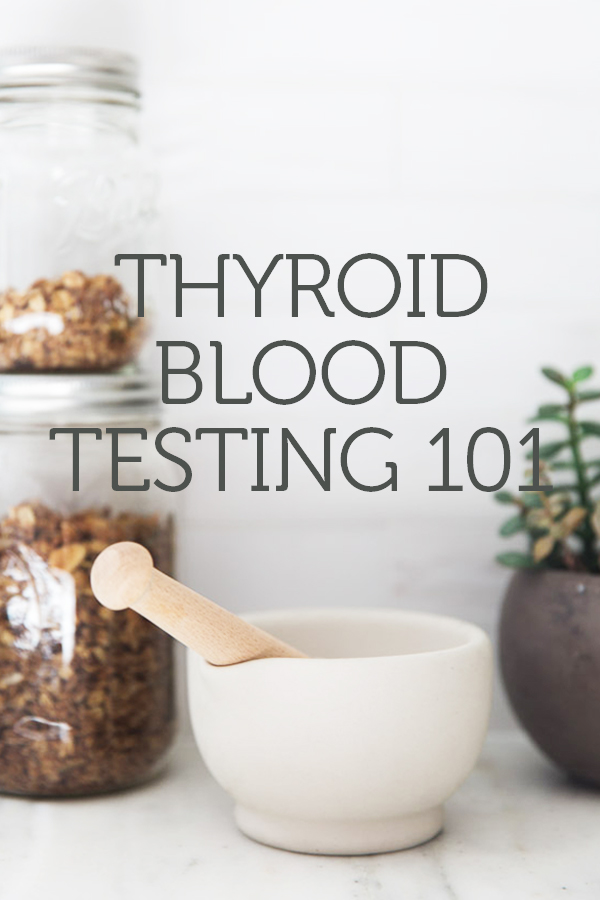When it comes to thyroid blood testing, there’s a lot of confusion. For those newly diagnosed. For veterans like myself. And especially for those who manage to never get an official diagnosis, but still feel like a hot mess.
After dealing with my own Hashimoto’s for a decade, I’ve gotten a little better about glancing at my numbers and being able to evaluate what it means about the state of my endocrine system. But it’s taken years of practice, and many far more knowledgable practitioners helping me advocate for myself, get the right panels one, and interpret the results properly.
Even though The Wellness Project has helped me manage my symptoms, the state of my thyroid is still a moving target, one that I try to check in with on paper every few months. I get a full thyroid panel to check my levels quarterly, which helps me tie some of my changing symptoms to my thyroid function and ensure I’m medicating properly through food and supplements.
I’ve been meaning to share the in’s and out’s of thyroid function testing for some time–what panels to request, and how to interpret the end results–but I’m glad I waited until I had one of those far more knowledgable practitioners willing to help me clue you in on the best course of action!
We’re so lucky to have Jill Grunewald as our guide for this portion of the #HashiPosse journey. She’s a Functional Medicine Certified Health Coach, founder of Healthful Elements, and most importantly, co-author of the fabulous resource: The Essential Thyroid Cookbook.
Read on for the biggest mistakes practitioners make when it comes to testing your thyroid, and Jill’s amazing advice for how to advocate for yourself at the doctor’s office.
For those who are unable to push their doctor to order the proper tests, Paloma’s At-Home Thyroid testing kits are a great resource that will allow you to take matters into your own hands at an affordable price. You can even take an extra $30 off with the code PHOEBE. More here.
With health and hedonism,
Phoebe
The Best Thyroid Blood Tests to Ask For and How to Read Them
It’s a common yet unfortunate scenario.
You don’t quite feel like yourself, so you go to the doctor. Fatigue, constipation, dry skin, and stubborn weight gain have been your constant companions for too long. Perhaps you’re frequently cold and your brush is revealing just how much hair you’re losing.
Your doctor may isolate these symptoms (with an anti-depressant, laxative, or a suggestion to “eat less and work out harder”). Or he or she may say, “Let’s check your thyroid.” (Right answer.)
“Checking” can have vastly different meanings, again, depending on the doctor’s worldview.
Many medical professionals (endocrinologists included) operate under the conventional medical conviction that low thyroid function (hypothyroidism) can be diagnosed via one blood test and one blood test only: thyroid stimulating hormone (TSH), a pituitary hormone that tells the thyroid to do its job.
But TSH can be “normal” in the face of raging hypothyroidism. It’s not wholly irrelevant, but it tells a small part of the story and should always be taken in the context of other thyroid hormones. (More on this in the chart below.)
Regarding the evaluation of TSH as a sole indicator of what kind of shape your thyroid is in, women’s health expert, Aviva Romm, MD states, “In a world where medical over-testing is rampant, I have to say, I find myself confounded by the fact that so many physicians are resistant to ordering anything but a TSH … as the first form of evaluation, when from a scientific and medical standpoint, that test can be normal and there can still be a low functioning thyroid. It’s outdated medical dogma to order solely this test.”
To add a third layer to this story, many doctors utilize outdated lab reference ranges—those parenthetical numbers next to your lab value that tell you whether you’re within the acceptable range.
This type of thyroid “treatment” leaves many un- or under-diagnosed.
“You may be told you have borderline thyroid problems or sub-clinical thyroid disease and your doctor will watch it,”says Dr. Mark Hyman. “What will he or she watch for? For you to get really sick?”
These archaic practices cast aside a vast group of people who often have subclinical hypothyroidism, meaning they will experience a bevy of symptoms, yet only see slight changes in their TSH blood labs.
An equally important layer: the antibodies that show the presence of Hashimoto’s/autoimmune hypothyroidism–thyroid peroxidase antibody (TPOAb) and thyroglobulin antibody (TgAb)–are tests that are infrequently performed.
You deserve to know if you have Hashimoto’s, which indicates thyroid tissue attack.
It’s estimated that a whopping 97 percent of people with hypothyroidism have Hashimoto’s. And it’s been shown that once you have one manifestation of autoimmunity—any manifestation—if it goes unmanaged, the likelihood of developing yet another autoimmune condition is significantly increased.
By using old guidelines and limited thinking, conventional medicine glosses over the millions who suffer with low thyroid function.
As the saying goes, “Don’t guess, test.” It’s important to do the right tests and to evaluate your labs based on the functional reference ranges, not antiquated ranges that often lead to misdiagnosis, mistreatment, and the passage of time with continued suffering.
Here’s a Cheat Sheet for the Top Issues in Thyroid Blood Testing:
- Telltale symptoms, thyroid not suspect (or tested)
- Testing TSH only
- Using outdated reference ranges
- Not testing for thyroid antibodies (TPOAb and TgAb)
Why is the Thyroid So Important?
The thyroid is a butterfly-shaped gland in your neck below your Adam’s apple and is hailed as “the master gland” of our complex and interdependent endocrine (hormonal) system. It’s the spoon that stirs our hormonal soup. It produces several hormones, with tri-iodothyronine (T3) and thyroxine (T4) being the most critical to our health.
Given that our endocrine system is responsible for growth, reproduction, energy, and repair and the thyroid is largely at the helm of this complex and interdependent system, an underfunctioning thyroid can have profound implications for the whole body.
Thyroid hormones transport oxygen into your cells and are critical for energy production. Every cell in the body has receptors for thyroid hormone and the thyroid is a master toggle that flips on the genes that keep cells doing their jobs.
It’s the boss of our metabolism and an underactive thyroid can affect weight, mental health, and heart disease risk.
Thyroid hormones affect our health systemically and directly act on the brain, the gastrointestinal tract, the cardiovascular system, bone metabolism, red blood cell metabolism, gall bladder and liver function, steroid hormone production, glucose metabolism, protein metabolism, neuromuscular function, digestion, and body temperature regulation.
Given the thyroid’s far-reaching impact, it’s not difficult to understand how misdiagnosis and under-diagnosis is nothing short of a public health concern.
You Are Your Best Advocate
If you have a cluster of symptoms pointing to hypothyroidism (find a list here), listen to your body and trust your intuition. Managing hypothyroidism and Hashimoto’s is an exercise in becoming the CEO of your health.
Reject the notion that TSH alone determines your thyroid status.
Don’t allow your doctor to use outdated lab reference ranges or to neglect testing for the antibodies that could reveal Hashimoto’s thyroiditis.
Arm yourself with the right information. Use the chart below as a cheat sheet. You can use this to get a new set of labs or to compare values with any recent labs you’ve done.
And if you need to take matters into your own hands, at-home options like the Paloma testing kit exist. They use functional ranges and include all the necessary numbers.
This is what I feel are the most clinically relevant thyroid tests and reference ranges. Ask your doctor for a “full thyroid panel”and make sure the following are included:
|
Lab |
Functional reference range |
| Free T3 (FT3) | 3.2 – 4.2 pg/mL |
| Free T4 (FT4) | 1.1 – 1.8 ng/dL |
| Reverse T3 (RT3) | 90 – 350 pg/mL or < 10:1 ratio RT3:FT3 |
| Thyroid stimulating hormone (TSH) | 0.9 – 2.0 mU/L |
| Thyroid peroxidase antibody (TPOAb) | < 4 or negative |
| Thyroglobulin antibody (TgAb) | < 4 or negative |
Some important notes:
- T3 is “the big daddy” of thyroid hormones and the most metabolically active, affecting almost every physiological process. The “free” in front of T3 (and T4) tells you what is available and unbound and therefore usable by the body.
- Reverse T3 is just that—the “reverse” of T3. It blocks thyroid receptors and can cause patients to be unresponsive or resistant to T3. When the body is in conservation mode due to stress, including fatigue, nutritional deficiencies, or infection, it will reroute thyroid hormones. You want RT3 low, and high RT3 is often brought about by intense or prolonged periods of stress. RT3 is typically high in people with more advanced adrenal dysfunction (aka HPA (hypothalamic-pituitary-adrenal) axis dysfunction). You can see that there are two metrics in the chart above for RT3; while RT3 alone is an indicator of thyroid hormone resistance, calculating your RT3: FT3 ratio can also provide information on thyroid status. Click here www.stopthethyroidmadness.com/rt3-ratio/ to calculate your RT3:FT3 ratio.
- According to many in the functional medicine community, anyone with TSH over 2.0 is hypothyroid, although TSH is an overall poor marker of thyroid function and should always be taken in the context of other thyroid labs, especially given that TSH can be normal in the face of low thyroid function.
This was a guest post courtesy of the wonderful Jill Grunewald, HNC, Functional Medicine Certified Health Coach, and founder ofHealthful Elements, is a thyroid health, Hashimoto’s, and alopecia (autoimmune hair loss) specialist and co-author of the #1 best selling Essential Thyroid Cookbook.
Have more questions about interpreting thyroid labs? Ask away in the comments section!



I was diagnosed as hypothyroid about 10 or 15 years ago and take both T3 and T4. I’ve never been tested for antibodies. I still have many symptoms, though of course they could be from other origins. I’ve always wondered whether those optimal reference ranges apply in the same way if you are taking thyroid meds. And I’ve never gotten a good answer as to when/whether to take the meds around the time of blood tests.
I would recommend not taking your thyroid medicine the morning of a blood test. Always best to test while fasting. So I usually go to the lab first thing and then take my meds afterwards. If you have T3 in your meds, you will see a false bump in your T3 levels on your bloodtests otherwise. Get your antibodies checked! It’s important.
What are some ranges for TPO? Mine were 565 so compared to 4 or even 9 it feels like I’m off the charts. Am I? Any way to Addie the antibodies directly?
don’t worry, that’s not off the charts. I’ve been at 2,000 before! It’s not unusual for Hashi people to be in the hundreds. Ideally, you’d keep it to under 50. But it’s not always possible. I’m still working out my particular formula for keeping my numbers down. Going off gluten more rigidly originally helped a lot. For me though there seems to be another piece of the puzzle I’m still missing. Also times of stress my numbers fly up again.
It is a very advantageous post for me. I’ve enjoyed reading the post. It is very supportive and useful post. I would like to visit the post once more its valuable content. Thanks for sharing useful blog.
I have had my thyroid removed. I have struggled to settle on a dosage of levothyroxine since. My GP had recently increased the dose to 250mg. I felt great, the best I’ve felt in 9 long years. After blood tests, my gp called to say I was over medicated and I’ve to reduce to my usual dose…which does not make me feel great. Is it worth seeing a specialist? My fear is, the GP has tunnel vision and is solely relying on blood work only. They are never concerned about any other aspect. P.s. I’m in the UK, not sure if this will impact on the answer in any way?
I have a TSH of 0.91 and my free T4 is is 0.9. I have a lot of symptoms but my dr says my results are fine.
I’ve lost over 1/2 of my hair , itchy skin , rashes on both arms , constipation , unexplained weight gain , and so on. What other place could check out my numbers is this could be a thyroid problem?
I was diagnosed with hypothyroidism in 2011. I’ve been under a lot of stress for the past 4 or 5 years. My doctor switched me from synthroid to levotheroxin last year and I do not feel any better what-so-ever. As a matter of fact I think my symptoms worsened, I’m constantly constipated, fatigued, and always in a brain fog. I joined the gym in June of this year was doing great then I ran out of medication and didn’t refill for a month, about 2 weeks ago my body ran out of energy and I totally crashed. My new doctor tested my thyrogloubin antibodies it came back <0.9. He told me that my thyroid was fine and there was no need to take and thyroid medication. I's this the only test that I need to determine my thyroid health.
All help and suggestions appreciated
I have a dr appt today and with your chart my T3 and T4 the ranges so different then what my lab report shows. Do you have the site you received this information from? I just want to bring it up to my dr so I am being treated correctly.
This was a guest post written by the authors of the Essential Thyroid Cookbook. Their info is linked.
if you are subclinical though at 5.42 and t4 is normal, do you not necessarily need medication right away?
https://drruscio.com/subclinical-hypothyroid-dos-donts-episode-53/
This was so incredibly helpful, thank you for posting this information. I’m so grateful to see it all laid out like this in such a user friendly way!
I was diagnosed with hypothyroid Hashimotos at the beginning of this year (after a full blood panel & pregnancy & subsequent miscarriage). My endocronologist, whom I *think* I like but I honestly don’t have anyone to compare her to, said that any changes in my diet will not make a difference to my hypothyroid condition because of the presence of antibodies. I guess what I’m wondering is – is this true? She has me on daily levothyroxine medication and has increased my dosage. But I’m wondering if there’s anything else that I can be doing proactively in addition to medication?